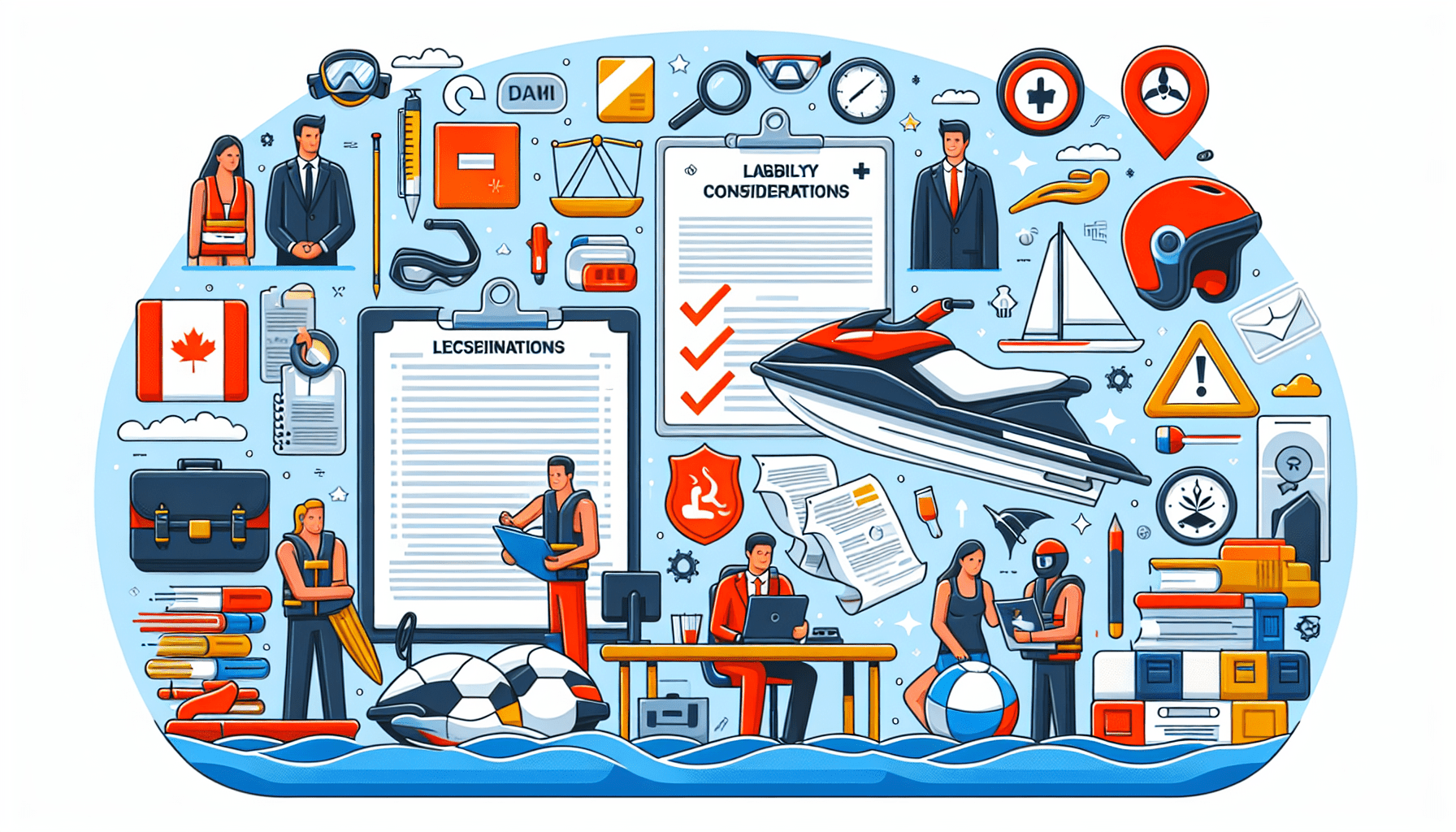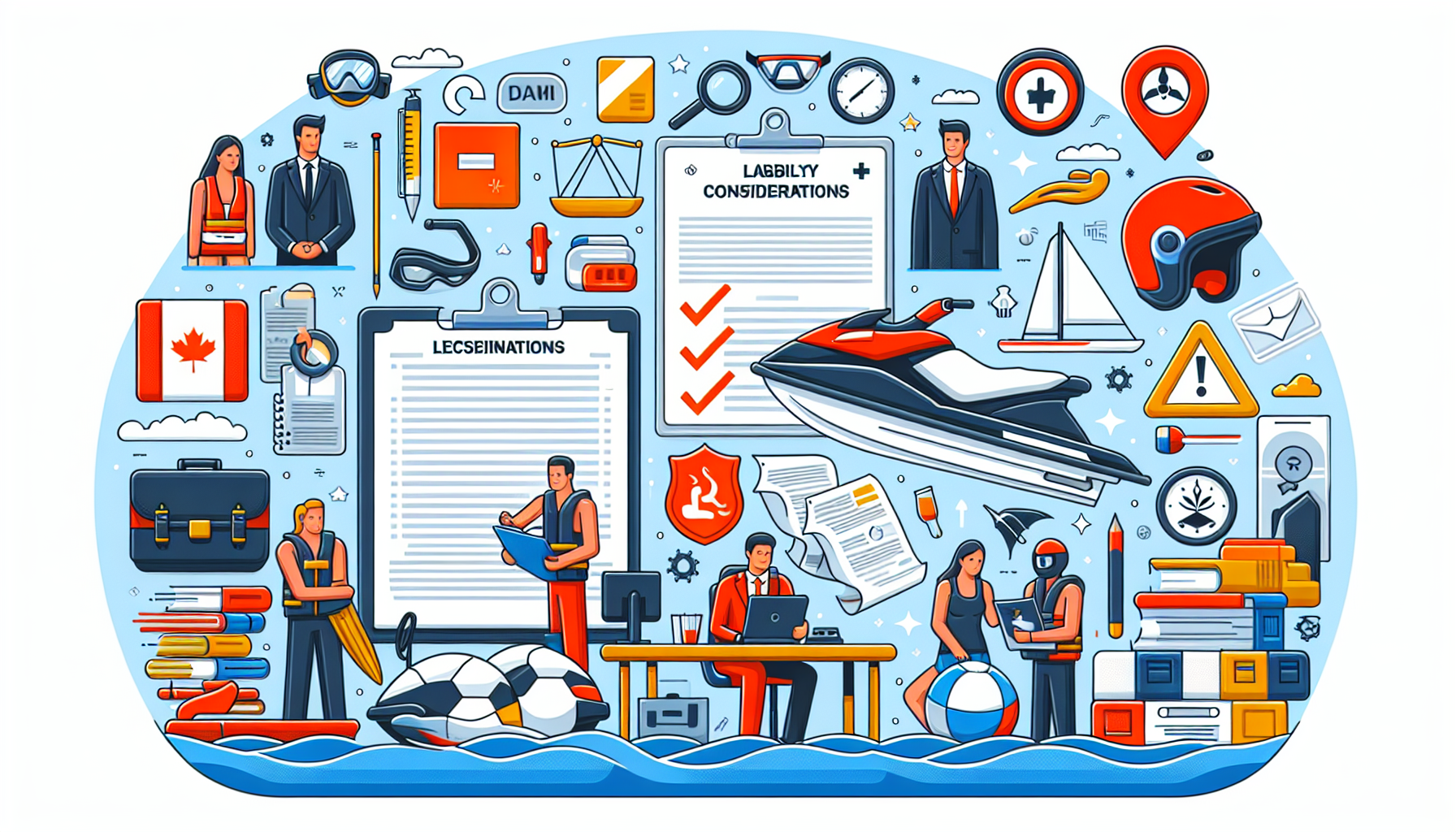Exploring the Legal and Regulatory Aspects of Renting Jet Skis

If you’re an avid jet skier looking to hit the waves, it’s important to brush up on the legal and regulatory aspects of renting these thrilling watercrafts. From understanding age restrictions and licensing requirements to knowing the rules and regulations specific to your location, staying informed is key to ensuring a safe and enjoyable experience. To make your jet ski rental process as smooth as possible, we recommend turning to the watersport experts at A2Z Powersport in Orange Beach, AL. With their vast knowledge and experience in the industry, you can trust them to provide top-notch equipment and guidance that complies with all legal and regulatory standards. So, get ready to make a splash and reach out to A2Z Powersport today!
Licensing Requirements
Age restrictions
Before you hit the water on a jet ski, it’s important to know the age restrictions that apply to operating one. In many jurisdictions, the minimum age to ride a jet ski is typically 16 years old, although some places might require riders to be 18 years old or older. These age restrictions are in place to ensure that individuals have the necessary physical and cognitive abilities to operate a personal watercraft safely.
Boating license
In addition to age restrictions, many jurisdictions also require individuals to obtain a boating license in order to operate a jet ski. A boating license demonstrates that you have completed a necessary course or exam that covers the rules and regulations of operating watercraft. This knowledge is crucial for the safety of both the jet ski rider and other individuals on the water.
Jet ski-specific license
Some areas may have specific licensing requirements that are specific to jet skis. These licenses may focus on the operation, maintenance, and safety considerations unique to personal watercraft. It is important to check with your local authorities to determine if a jet ski-specific license is required in your jurisdiction.
Insurance Coverage
Liability insurance
When renting a jet ski, it is essential to consider insurance coverage. Liability insurance protects you in the event that you cause damage to property or injure someone while operating the jet ski. This coverage is crucial as accidents can happen even to the most experienced riders. Before renting, ensure that the rental agency provides liability insurance coverage for their jet skis.
Collision insurance
Collisions can occur unexpectedly, especially in crowded waterways. Collision insurance is designed to cover any damage to the jet ski caused by a collision with another watercraft or stationary object. It is important to review the rental agreement and insurance coverage to understand what collision insurance is included and what you may be liable for in the event of an accident.
Personal injury coverage
Accidents on the water can result in personal injuries, and personal injury coverage is there to protect you in such cases. This type of insurance provides coverage for medical expenses and other costs related to injuries sustained while riding a jet ski. Understanding the level of personal injury coverage provided by the rental agency is important to ensure you are adequately protected.
Rental Agreement
Terms and conditions
Before renting a jet ski, it is crucial to carefully review the rental agreement’s terms and conditions. This document outlines the responsibilities and obligations of both the rental agency and the renter. It covers aspects such as rental duration, payment terms, maintenance responsibilities, and liability. Make sure to read this agreement thoroughly and clarify any doubts or concerns with the rental agency before signing.
Restrictions on use
Rental agreements often include restrictions on the use of jet skis. These restrictions may include prohibited areas or waterways where riding is not allowed, limitations on the number of passengers, and restrictions on towing activities. It is important to adhere to these restrictions to ensure your safety and avoid potential legal issues.
Liability waiver
Most rental agreements will require you to sign a liability waiver. This document releases the rental agency from liability in case of accidents or damages incurred during the rental period. It is important to read and understand the terms of the waiver before signing, as it may affect your rights in the event of an incident. If you have any concerns or questions about the liability waiver, it is advisable to consult with a legal professional.
Safety Regulations
Life jacket requirements
Wearing a life jacket is a fundamental safety measure when participating in any water activity, including jet skiing. Different jurisdictions have specific life jacket requirements, such as the type and size of life jacket to be worn. It is essential to comply with these requirements to ensure your safety in case of an accident or emergency.
Operating rules and restrictions
To ensure a safe and enjoyable experience on a jet ski, it is important to follow the operating rules and restrictions set by local authorities. These rules may include speed limits, distance restrictions from other vessels or swimmers, and guidelines for passing and overtaking. Familiarize yourself with these rules before operating a jet ski to promote safety on the water.
Speed limits
Speed limits are implemented in most waterways to prevent accidents and maintain a safe environment for all users. It is essential to adhere to these speed limits when riding a jet ski. Excessive speed can lead to loss of control and increased risk of collisions with other watercraft or fixed objects. Always prioritize safety by keeping within the designated speed limits.
Environmental Regulations
Wildlife protection
Jet ski riders have a responsibility to protect the environment and the wildlife that inhabits the waterways. It is crucial to be aware of any regulations in place to safeguard marine life. These regulations may include no-wake zones, restrictions on approaching certain species or their habitats, and guidelines for responsible interaction with marine wildlife.
Noise pollution
Jet skis can produce noise levels that may disturb other waterway users and wildlife. To minimize noise pollution, authorities often impose noise regulations on jet ski operators. These regulations may include limitations on maximum noise levels or restricted operating hours in noise-sensitive areas. Being considerate of others and adhering to noise regulations helps ensure that everyone can enjoy the water without disruption.
Fuel spill prevention
responsible fuel handling is essential to protect the environment and prevent fuel spills that can harm marine life and ecosystems. When refueling a jet ski, it is crucial to follow proper procedures and use spill containment devices if available. Additionally, be mindful of any fueling restrictions in place to minimize the risk of accidental spills.
Towing Regulations
Towing restrictions and guidelines
Jet skis are often used for towing activities such as water skiing or tubing. However, there may be specific towing restrictions and guidelines that must be followed. These restrictions may include limitations on the number of people being towed, required safety equipment, and speed limits while towing. Understanding and adhering to these regulations is crucial for the safety of both the riders and the individuals being towed.
Safety precautions for passengers
If you have passengers on your jet ski, their safety should be your top priority. Ensure that all passengers wear properly fitting life jackets and understand the necessary safety precautions. It is also important to communicate with your passengers and establish clear guidelines for behavior and safety during the ride.
Required equipment
When towing, certain equipment may be required to ensure the safety of all individuals involved. This equipment may include tow ropes, mirrors for the operator to have a clear view of the towed individuals, and appropriate safety flags or signaling devices. Familiarize yourself with the specific equipment requirements in your area to ensure compliance and safety.
Maintenance and Inspection
Regular maintenance protocols
Jet skis, like any machinery, require regular maintenance to operate safely and efficiently. Rental agencies typically have maintenance protocols in place to ensure that their jet skis are in good working condition. However, if you own a jet ski, it is important to follow the manufacturer’s recommended maintenance schedule to prevent mechanical failures and ensure a safe riding experience.
Inspection requirements
Before operating a rented jet ski, it is essential to inspect the watercraft for any signs of damage or malfunctions. This inspection should include checking for loose or damaged parts, verifying the proper operation of safety features such as the kill switch, and assessing the overall condition of the jet ski. Report any concerns or damages to the rental agency before proceeding to ensure your safety and avoid liability.
Reporting damages
In the event of an accident or damage to a rented jet ski, it is crucial to report the damages to the rental agency immediately. Promptly reporting damages ensures that necessary repairs can be made and that you are not held liable for pre-existing issues. Failure to report damages may result in additional charges or legal consequences, so it is essential to be proactive in reporting any incidents.
Legal Consequences
Fines and penalties
Failure to comply with the laws, regulations, and terms outlined in the rental agreement can result in fines and penalties. These consequences may vary depending on the severity of the violation and the jurisdiction in which the offense occurred. It is important to familiarize yourself with the applicable laws and regulations and to adhere to them to avoid costly fines and legal issues.
Criminal charges
Serious violations, such as operating a jet ski under the influence of drugs or alcohol, can result in criminal charges. Operating a jet ski recklessly or negligently, causing harm to others, or engaging in illegal activities while on the water can also lead to criminal charges. To protect yourself and others, always operate a jet ski responsibly and within the boundaries of the law.
Civil liabilities
Failure to exercise caution and adhere to safety regulations can result in civil liabilities. If your actions lead to injury or property damage to other individuals, you may be held legally responsible for their losses and may be required to compensate them for any damages incurred. Understanding and obeying safety regulations is essential to protect yourself from potential civil liabilities.
Jurisdiction and Governing Laws
Federal laws
Various federal laws govern the operation of jet skis and other personal watercraft. These laws may include regulations concerning minimum safety equipment requirements, noise emissions, and navigational rules. It is important to understand and comply with these federal laws to ensure a safe and law-abiding experience on the water.
State laws
In addition to federal laws, each state has its own set of laws and regulations governing the operation of jet skis. These state laws may impose additional requirements or restrictions specific to the jurisdiction. It is essential to familiarize yourself with the state laws applicable to the area where you plan to ride a jet ski to avoid legal complications and ensure compliance.
Local regulations
Local municipalities or governing bodies may also establish regulations to address specific concerns related to jet ski operations. These regulations may cover issues such as speed limits, noise restrictions, and restricted areas. It is important to research and understand the local regulations in the area where you plan to ride a jet ski to avoid violating any ordinances and maintain a respectful relationship with the local community.
Enforcement Agencies
Coast Guard
The United States Coast Guard plays a vital role in enforcing federal laws and regulations related to jet ski operations. Coast Guard personnel may conduct patrols on waterways to ensure compliance with safety standards, issue citations for violations, and respond to emergencies. It is important to be familiar with the Coast Guard’s authority and cooperate with their instructions when encountered.
Marine patrol units
Many jurisdictions have dedicated marine patrol units responsible for enforcing laws and regulations concerning watercraft operation. These units may consist of law enforcement officers tasked with conducting patrols, responding to emergencies, and ensuring compliance with safety regulations. Cooperation with marine patrol units is essential to maintain a safe and legal environment on the water.
Department of Natural Resources
The Department of Natural Resources (DNR) or its equivalent in each state often has authority over the regulation and enforcement of water activities. DNR personnel may enforce state and local laws related to jet ski operations and conduct inspections to ensure compliance. It is important to be aware of the DNR’s role and cooperate with their instructions to promote safety and maintain a positive relationship with governing authorities.
In summary, understanding the legal and regulatory aspects of renting and operating a jet ski is crucial for both your safety and compliance with the law. Adhering to age restrictions, obtaining necessary licenses, and obtaining appropriate insurance coverage are essential steps to take before hitting the water. Familiarizing yourself with the terms and conditions of the rental agreement, following safety regulations, and respecting the environment and wildlife also contribute to a safe and enjoyable jet ski experience. By staying informed about the various laws and regulations, you can ensure that your jet ski adventures are both thrilling and responsible. So, before you head out on your next jet ski adventure, remember to review the legal and regulatory aspects, and consider renting your jet ski from the watersport experts at A2Z Powersport located in Orange Beach, AL. They can provide you with the necessary information and equipment to make your experience safe and enjoyable.










